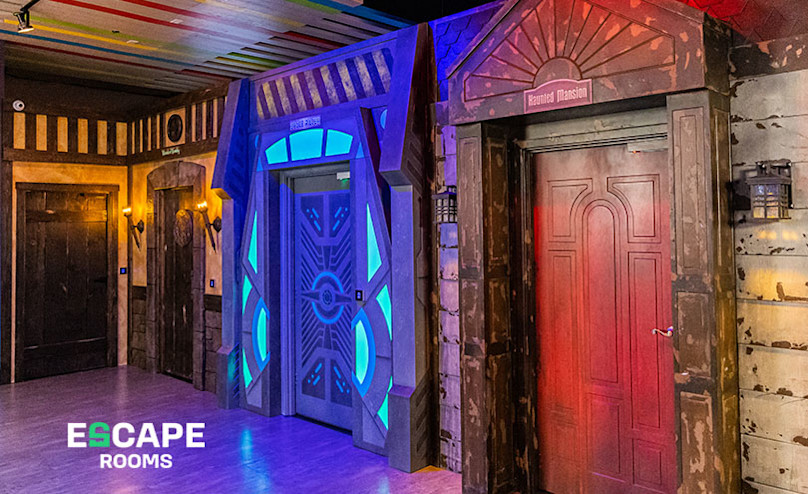Escape Room Minneapolis Mall of America-- Immersive and Fun
Escape Room Minneapolis Mall of America-- Immersive and Fun
Blog Article
Group Techniques: How to Collaborate Effectively in an Escape Area
Browsing the complexities of an escape area demands even more than plain interest; it needs a well-coordinated method grounded in clear communication, tactical role jobs, and experienced time monitoring. Teams need to actively listen per participant's understandings, designate roles that line up with individual toughness, and preserve routine check-ins to ensure focus and avoid redundancy. By fostering an environment that values communication and adaptability, groups can significantly enhance their efficiency and success prices. The nuances of these methods can change the experience, however exactly how precisely can they be executed to optimize the potential for success?
Establish Clear Interaction

To promote clear communication, it is important to mark a central point of contact for info circulation. This duty entails summarizing searchings for and suggested approaches to ensure everyone stays on the same web page. In addition, adopting an organized strategy to discussions can protect against disorderly exchanges. Brief, focused updates from each group participant can keep the group informed without overwhelming them with info - best escape room.

Assign Functions Purposefully
While clear communication establishes the foundation for effective team effort, designating functions purposefully makes sure that each staff member's toughness are utilized properly. In a getaway room scenario, the time-sensitive and intricate nature of difficulties demands a well-organized strategy to job delegation. By recognizing and leveraging private competencies, teams can maximize their analytical capacities and boost general efficiency.
First, analyze the one-of-a-kind skills and attributes of each participant. Someone with an eager eye for detail may stand out in finding surprise things, while a logical thinker might be better matched to resolving puzzles. It's similarly important to have a leader who can supervise progress, manage the timeline, and make definitive calls when necessary. This role usually calls for solid organizational and interpersonal skills.
2nd, ensure that duties are versatile and versatile. As new challenges emerge, the team should have the ability to pivot, reallocating jobs as required. This adaptability helps maintain momentum and stops bottlenecks that could occur due to rigid role tasks.
Ultimately, a critical method to function project not just optimizes the staminas of each employee but also promotes a natural atmosphere, driving the team towards a successful escape.
Use Diverse Abilities
Identifying and utilizing the diverse skills within your team can considerably boost from this source your efficiency in an escape room. Each employee brings special strengths to the table, and successfully leveraging these capabilities can accelerate problem-solving and improve general efficiency. A team member with strong analytical skills could excel at decoding intricate codes or patterns, while an additional with eager observational capabilities might quickly identify surprise ideas that others might neglect.
Reliable communication is key to using these diverse skills. Encourage employee to articulate their insights and ideas without delay, making certain that all potential services are thought about. This inclusive approach promotes a vibrant environment where imagination and vital reasoning can prosper. Furthermore, assigning jobs that straighten with each member's strengths can protect against bottlenecks and make sure that progress is continuous.
In addition, diversity in abilities commonly translates to variety in believing designs, which is vital in a getaway space setup. While some difficulties might require rational thinking and precision, others may profit from creative and lateral reasoning. By recognizing and leveraging this variety, teams can deal with a broader series of challenges more effectively, thus raising their chances of a successful retreat.
Manage Time Effectively

First, allot first minutes for a fast survey of the area. Recognize noticeable problems and split tasks based upon group members' strengths, ensuring that nobody is idle. Establish inner time checkpoints to examine progression regularly; as an example, objective to have half the challenges solved by the mid-point of the video game. This technique can assist maintain the group concentrated and avoid time from sliding away undetected.
Additionally, stay clear of one-track mind. If a problem is taking as well long, rotate team members or carry on to another challenge, returning later on with fresh viewpoints. Interaction is paramount-- maintain everyone updated on addressed puzzles and continuing to be jobs to stay clear of repetitive initiatives.
Lastly, use any tips or ideas sparingly yet purposefully - best escape room. Knowing when to request for help can save valuable time. By adhering to these time monitoring concepts, teams can significantly enhance their opportunities of an effective and pleasurable retreat area experience
Debrief and Mirror
Reflection is a crucial facet of group growth and improvement in the context of getaway spaces. When the difficulty is finished, whether efficiently or otherwise, it is crucial for the group to participate in an organized debriefing you could look here session. This process enables group participants to analyze their efficiency, determine strengths, and pinpoint areas for enhancement.
Start the debrief by discussing what worked out. Highlight details circumstances of effective interaction, problem-solving, and cooperation. Identifying these positive actions strengthens them and encourages their repeating in future challenges.
Talk about minutes of complication, miscommunication, or inadequate approaches. Encourage an open and positive discussion where group members can share their point of views without fear of objection.
Final Thought
In conclusion, successful partnership in a retreat area is predicated upon clear interaction, strategic function tasks, the efficient application of diverse skills, and proficient time administration. By developing a cohesive and adaptive team environment, the chance of effectively resolving challenges and accomplishing the purpose of escaping the space is significantly boosted.
Report this page